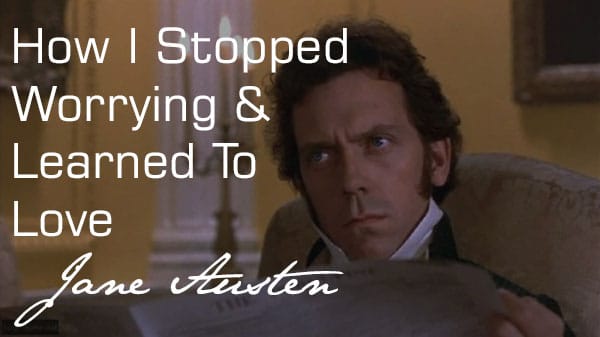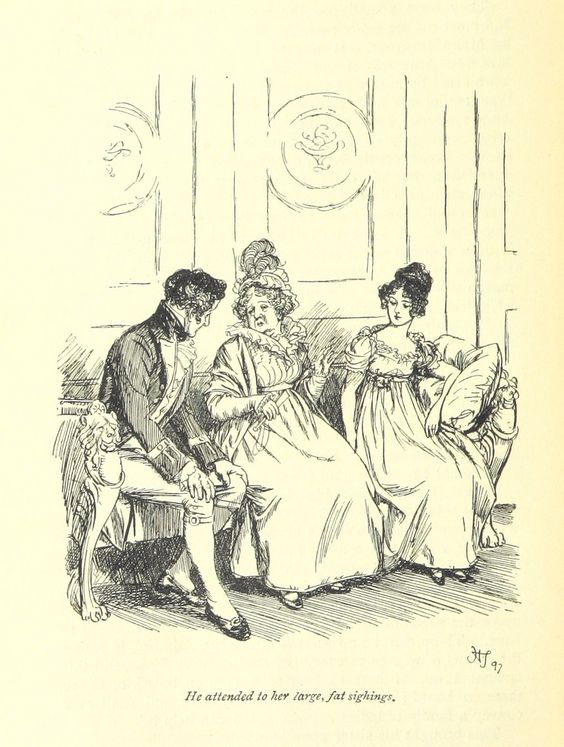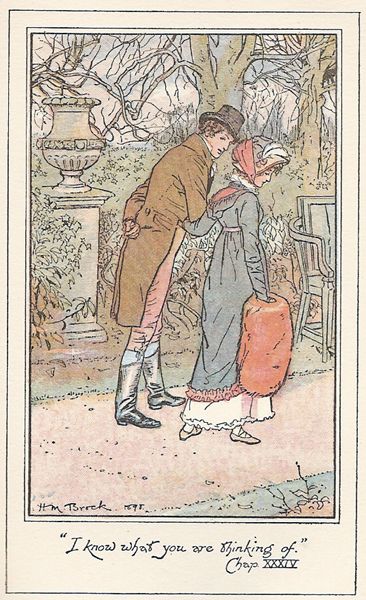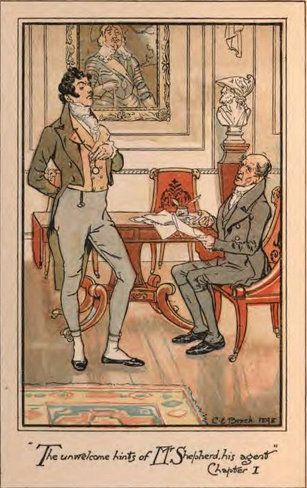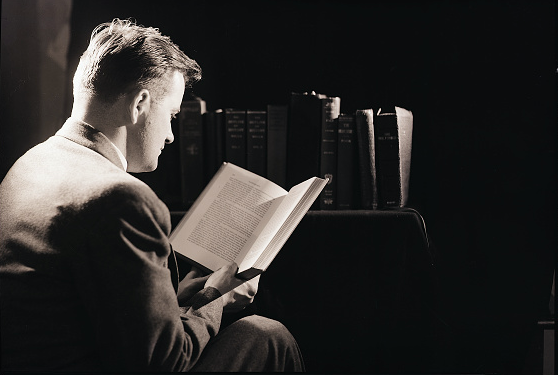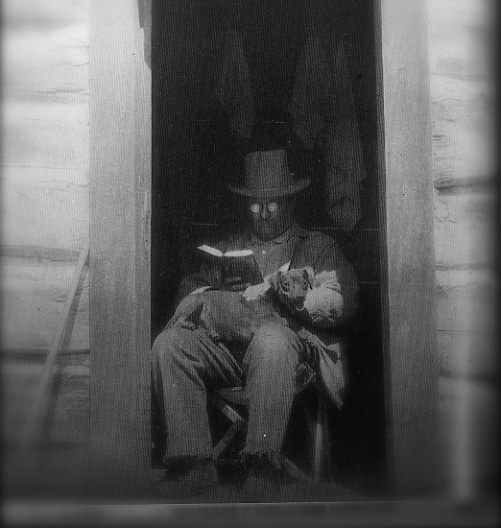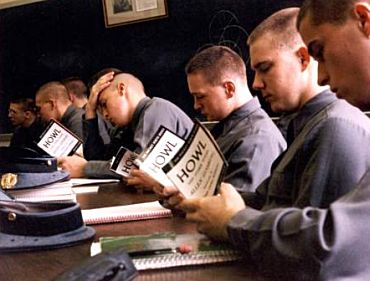Back in my law school days, I was taking a break from studying one Saturday to do some mindless TV watching. As I was flipping through the channels, I came across Hugh Laurie, of Dr. House fame, all decked out in 19th-century English gentleman garb. Because I was a House fan, I was curious what Hugh Laurie sounded like with his native British accent, so paused my channel surfing to find out.
Then I looked down at the info ticker the cable box displays on the screen and saw that I was watching Sense and Sensibility.
Ugh. Jane Austen. No way I would enjoy that.
I associated Jane Austen with a group of girls I knew in high school who would watch the BBC’s 6-hour Pride and Prejudice miniseries in marathon sessions during sleepover parties. And I had never read the books these films and television shows were based on, which seemed like foo-fooey lady stuff.
No, I wasn’t going to watch a movie that was surely made for those who read the Baby-Sitters Club and love rom-coms. My plan was to flip the channel as soon I heard Dr. House talk British.
Two hours later, the end credits for Sense and Sensibility scrolled down the screen.
I had watched the entire thing. Didn’t even get up to go to the bathroom.
Not only did I watch the whole movie, I remember thinking, “Man, that was actually pretty damn good.”
Thanks to Dr. House, my resistance to Austen was broken, and I found myself genuinely curious about her books. So I got the free version of her collected works and slowly started working my way through what are arguably her three best: Sense and Sensibility, Pride and Prejudice, and Emma.
And I’ll be darned if I didn’t truly enjoy them all.
If you’re a man who’s written off Jane Austen for the same reasons I once did, I’m hoping this post will at least get you to consider giving her classics a read. They’re not just for chicks. Here’s why:
Why Every Man Should Read Jane Austen
With surprisingly compelling plots and deft dialogue, Austen’s novels are just plain enjoyable and entertaining to read. What might be most surprising to those who associate Austen with the frilly clothes and seemingly stuffy manners of the Regency period, is that Austen has a truly sharp wit. She often skewers the attitude and cultural mores of the day, describing things with tongue in cheek, and I sometimes found myself chuckling out loud as I read her novels.
But beyond the very real pleasure that comes with reading her novels, there are some other reasons to consider adding Austen to your personal library:
Austen Will Help You Develop Your Theory of Mind
A few years ago, I wrote an article on why men should read more fiction, and one of the reasons I gave is that it helps develop what cognitive psychologists call our “theory of mind.” Theory of mind is what allows us to assess the mental states (thoughts, feelings, beliefs) of others based on a whole host of input, and to use that assessment to predict and explain what people are thinking. Theory of mind allows us to strategize and outwit opponents in a business context (and avoid being deceived in turn), as well as navigate the unspoken complexities of romantic relationships (“I think she thinks I like her, but I don’t. How do I let this girl down easy?”).
Unfortunately, men have gotten the short end of the evolutionary stick when it comes to theory of mind. Girls tend to develop theirs faster than boys, and women generally do better on theory of mind tasks than men.
Fortunately, it’s a skill that can be developed, and reading fiction is one way to do so. Studies show that when we read fiction, the parts of our brain responsible for theory of mind light up and are heavily engaged. Narratives require us to guess at the hidden motives of characters, figure out what their enemies or lovers may or may not be thinking (when the author doesn’t tell us explicitly), as well as keep track of all the social interactions between them.
When it comes to building the muscle of our theory of mind, Jane Austen’s novels are akin to heavily-plated barbells. They’re all about relationships and what everyone thinks about those relationships. Austen’s novels are filled with dozens of characters who constantly guess at the thoughts and intentions of the other characters; each interacts with the others in complex ways that influence the relationships of nearly everyone in the book.
For example, in Pride and Prejudice, there are almost 50 different characters, and all of them connect with each other in some subtle way. Keeping track of this web of relationships and figuring out what all those subtle 19th-century British social gestures really mean, becomes an intense workout in theory of mind. Whenever I finish a Jane Austen novel, I thus feel a bit more socially nimble.
If you want to become a better strategizer, leader, husband, father, or lover, reading Austen can certainly help.
Being Familiar With Austen Is an Essential Part of Being Culturally Literate
As we’ve talked about before on the site, there’s a Great Conversation about the big ideas in life going on in Western culture that began in ancient Greece and continues today. Austen is one of the participants in this discussion. When it came to selecting the 26 writers who have been the most important and influential in shaping culture in the West, eminent literary critic Harold Bloom picked Austen as part of the “Western Canon – The Books and School of the Ages.” Why? Her use of irony, natural and realistic dialogue, as well as inner-dialogue, helped shape the course of literature. She also hit on the big ideas of love, virtue, and self-knowledge, and her works are referenced in numerous works of psychology, sociology, and philosophy. As just one example, in After Virtue, Scottish philosopher Alasdair MacIntyre uses Austen’s works alongside those of Benjamin Franklin and Aristotle as examples of three different systems of virtue.
References to Austen also regularly appear in the media, from articles of hard journalism to pop culture. Not only have there been numerous direct adaptations of her novels, but their plots have also been more loosely incorporated into many films and television shows. For example, the 1995 hit Clueless was actually a modern take on Austen’s Emma.
If you’d like to be a more adroit participant in the Great Conversation, grasp pop culture references that might otherwise go over your head, and be all around more culturally astute, then you need to be up on your Austen.
Austen’s Stories Teach Important Life Lessons
There are likely countless life lessons you could take from Jane Austen’s novels, but here are two big ones that stuck out to me as being just as applicable to men as they are to ladies.
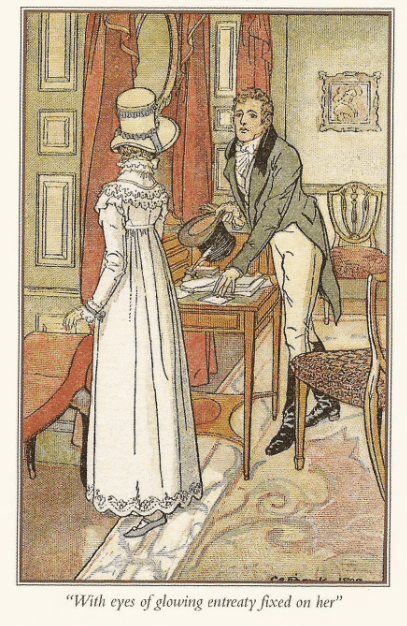
Love with your heart and your head. Austen’s novels are often lumped in with romance fiction of the emotional and escapist variety, but as I read her work, I discovered that she actually takes a very level-headed, eyes-wide-open approach to love. For Austen, a flourishing life requires that you love with both your heart and your head.
She frequently shows the unhappiness that transpires when someone marries either out of pure romantic passion or cold, calculated convenience.
Take Sense and Sensibility in which Austen explores the grief that can follow a love based solely on the passions. The young Marianne Dashwood is romantic love personified. In one scene she describes why she could never marry a guy like dull Edward Ferrars:
“His eyes want all that spirit, that fire, which at once announce virtue and intelligence. And besides all this, I am afraid, mama, he has no real taste. Music seems scarcely to attract him, and though he admires Elinor’s drawings very much, it is not the admiration of a person who can understand their worth. It is evident, in spite of his frequent attention to her while she draws, that in fact he knows nothing of the matter. He admires as a lover, not as a connoisseur. To satisfy me, those characters must be united. I could not be happy with a man whose taste did not in every point coincide with my own. He must enter into all my feelings; the same books, the same music must charm us both. Oh! mama, how spiritless, how tame was Edward’s manner in reading to us last night! I felt for my sister most severely. Yet she bore it with so much composure, she seemed scarcely to notice it. I could hardly keep my seat. To hear those beautiful lines which have frequently almost driven me wild, pronounced with such impenetrable calmness, such dreadful indifference.”
For Marianne, love requires that you and your companion have everything in common. But notice she focuses on somewhat superficial things: books, music, art. She wants a soulmate, but she’s not examining the suitor’s soul. Whether her lover is noble and good doesn’t even cross her mind.
As chance would have it, Marianne meets her ideal match in the dashing, gentleman sportsman Mr. Willoughby. He literally and figuratively swoops Marianne off her feet the moment they meet, debonairly picking her up and carrying her home after she falls down a hill in the rain. She then rapturously discovers that Willoughby has the same tastes in music, books, and art as her. He seems to fulfill her every romantic desire and dream.
Yet Willoughby turns out to be an opportunistic scoundrel who leads Marianne along for months and then leaves her high and dry. Marianne, hopeless romantic that she is, is heartbroken and nearly dies of grief.
Marianne’s sister Elinor, on the other hand, takes a much more even-keeled, mature approach to love. Yes, she desires a husband she enjoys being around, has things in common with, and is physically attracted to. But she believes a suitor’s character is his most important trait. Was he a genuinely good person that would inspire her to be a better person herself?
Tastes change and beauty fades during life, but a person’s virtue and temperament generally stay the same. Will you still want to be married to your lover thirty years hence if she no longer enjoys the same books as you or has gotten wrinkles and liver spots?
In Pride and Prejudice, the example of Mr. Bennet, the father of the book’s main protagonist — his daughter Elizabeth — offers insight about balancing love with your heart and head. Mr. Bennet isn’t happy in his marriage and is always rolling his eyes at his “silly wife.” Austen explains the root of Bennet’s unhappiness:
“captivated by youth and beauty, and that appearance of good humour which youth and beauty generally give, [Bennet] had married a woman whose weak understanding and illiberal mind had very early in their marriage put an end to all real affection for her.”
In short, Mr. Bennet let his feelings wholly dictate his choice of spouse, and married his wife solely for her looks and seeming charm, instead of using his head to take into account factors like character and temperament. His desire blinded him to the fact that the future Mrs. Bennet was a vapid, petty, social climber.
Because of his poor choice as a youth, the patriarch of the Bennet clan doesn’t wish his beloved daughter Elizabeth to make the same mistake. When he finds out she wants to marry Mr. Darcy, whose character Elizabeth and her family had initially misread, he lovingly, but gruffly asks his daughter to examine her motives:
“‘He is rich, to be sure, and you may have more fine clothes and fine carriages than Jane. But will they make you happy?’
‘Have you any other objection,’ said Elizabeth, ‘than your belief of my indifference?’
‘None at all. We all know him to be a proud, unpleasant sort of man; but this would be nothing if you really liked him.’
‘I do, I do like him,’ she replied, with tears in her eyes, ‘I love him. Indeed he has no improper pride. He is perfectly amiable. You do not know what he really is; then pray do not pain me by speaking of him in such terms.’
‘Lizzy,’ said her father, ‘I have given him my consent. He is the kind of man, indeed, to whom I should never dare refuse any thing, which he condescended to ask. I now give it to you, if you are resolved on having him. But let me advise you to think better of it. I know your disposition, Lizzy. I know that you could be neither happy nor respectable, unless you truly esteemed your husband; unless you looked up to him as a superior. Your lively talents would place you in the greatest danger in an unequal marriage. You could scarcely escape discredit and misery. My child, let me not have the grief of seeing you unable to respect your partner in life.'”
Mr. Bennet wants to make sure his daughter loves with both her heart and head so that she doesn’t make the same mistake that he did. He wants her to marry a man she both loves and respects.
Austen’s novels are full of similar examples on this theme. And while the main characters in her books are women, the lesson is just as applicable to men. Some research actually indicates that men, particularly men in their mid-twenties, fall faster into head-over-heels love than women do.
Consequently, they may end up blind to the many red flags their significant other is waving. It’s not until passion-induced love blindness wears off that these men realize that they’re in a dead-end and possibly toxic relationship.
So take a lesson from Miss Austen, gents. Love passionately, but love with both your heart and mind.
Know thyself and humbly seek personal growth. All of Austen’s heroines go through some sort of peripeteia about themselves. In Pride and Prejudice, Elizabeth Bennet discovers that she was just as prideful and just as prejudiced as Mr. Darcy. In Emma, Emma comes to see that her meddling in the love lives of others has only caused heartache. And in Sense and Sensibility, Marianne realizes that she let her emotions blind her to the true character of Mr. Willoughby.
It thus seems an important lesson that Austen is trying to convey to her readers is to take serious the admonition inscribed at the ancient Greek oracle at Delphi: “Know thyself!” Have some self-awareness. Get outside of your own head and try to see yourself how others might see you (theory of mind!) so you can triangulate a more accurate idea of who you really are, what’s truly driving your behavior, and the kind of consequences those actions have.
But don’t stop there. You’ve got to have the humility to accept that you might not be as good or noble as you think you are and then take action to improve yourself. Wallowing in self-pity about your current wretchedness isn’t allowed in the world of Jane Austen. Yes, feel remorse and even shame for your faults, but then use those feelings to fuel the journey towards self-improvement.
Conclusion
There’s a place in a man’s library for nonfiction biographies by writers like Edmund Morris and Stephen E. Ambrose, and for virile fiction by the likes of Cormac McCarthy and Larry McMurtry. And, there should be a place for some Austen as well. I promise you your testicles won’t ascend back into your body should you decide to crack open Sense and Sensibility. In fact, it’ll make you a more well-rounded man.
Because Austen’s novels are not only plain enjoyable, but can increase your theory of mind, help you participate in the Great Conversation, and offer important life lessons, I’m going to encourage both my daughter and my son to read them when they get old enough. They’d be better off learning about relationships from an 18th-century spinster (Austen never married), than learning about it through osmosis from modern TV and movies.
If there’s one novel I recommend starting off with, it’s Pride and Prejudice. It’s the one I enjoyed the most. Beware: Austen’s novels are tomes, so give yourself some time to read through them. (They can all be found on Amazon either for free, or a couple bucks at most. They can also be found for free on Project Gutenberg.)
If reading Austen doesn’t suit your fancy, consider watching a film adaptation of her novels. Sense and Sensibility from 1995 has an all-star cast (Kate Winslet, Emma Thompson, Hugh Grant, Hugh Laurie, Alan Rickman) and as I said at the start, is really quite good. 1996’s Emma with Gwyneth Paltrow is supposed to be pretty good too, though I haven’t seen it. And Pride and Prejudice was made into a mini-series in 1995 (apparently the mid-90s was Jane Austen’s modern heyday!), stars Colin Firth as Mr. Darcy, and is top notch, or at least those girls from high school said so. Hey, turns out they were on to something after all.
Tags: Books

